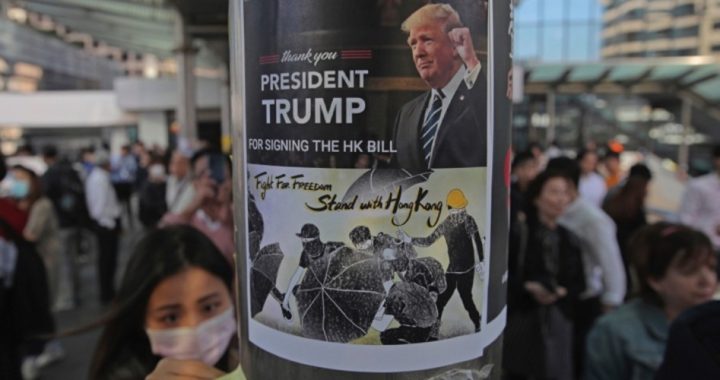
When he was considering whether or not to sign two bills passed nearly unanimously by Congress strengthening a long-term trade agreement with Hong Kong dating back to 1992, President Trump admitted it was complicated. On Fox News he said, “Look, we have to stand with Hong Kong. But I’m also standing with President Xi. He’s a friend of mine. He’s an incredible guy.”
Xi is also facing a complicated situation at home, as explained in a book that is now influencing American foreign policy with China. That book, The Hundred-Year Marathon: China’s Secret Strategy to Replace America as the Global Superpower, written by former “panda hugger” Michael Pillsbury, spells out the power struggle taking place in Beijing between the hawks and the moderates.
The hawks continue to push hard to replace the United States as the world’s hegemon no later than 2049 (the 100th anniversary of the communists’ takeover of China). The softliners, or moderates as Pillsbury — now sporting the moniker of “panda thugger” — calls them, want to come to terms with Trump soon to keep the Chinese economy from cratering under the weight of sanctions ratcheting upwards under the Trump administration.
That’s the background that makes sense of Trump’s statement following his signing of the two bills: “I signed these bills out of respect for President Xi, China, and the people of Hong Kong. They are being enacted in the hope that leaders and representatives of China and Hong Kong [both hawks and moderates] will be able to amicably settle their differences leading to long term peace and prosperity for all.”
The new law amends the U.S. Hong Kong Policy Act of 1992 that has guided U.S. foreign and economic policy with that nation. When China took over Hong Kong from Britain in 1997 it set up a unique “one country, two systems” arrangement giving the island country assurances that China would respect its rules and policies without interference.
Hong Kong generates more than a third of a trillion dollars’ worth of commerce for China annually, with much trade denominated in dollars. The U.S. “free trade” agreement with Hong Kong has allowed more than 725 U.S. companies to set up regional offices there in order to expedite and manage that enormous flow of commerce with mainland China.
The new laws complicate things. They require that a determination be made annually that it remains “sufficiently autonomous” from its communist neighbor to justify that unique arrangement. They also prohibit supplying Hong Kong police with various “non-lethal” military equipment and supplies while providing sanctions for individuals guilty of violating the human rights of Hong Kong protesters.
China is to blame for the rise in tensions between itself and Hong Kong. Unhappy, as totalitarians usually are over any limitation of their power, the Chinese communists have been slowly infringing on the island’s sovereignty. The island’s president is a lackey of the communist Chinese and offered no resistance when Beijing officials wanted to install an extradition treaty to bring troublemakers from Hong Kong to the mainland for trial, conviction, torture, and execution.
The protests began in June and accelerated from there. Early on the president told his officials to “go easy” on China over the matter for fear that, as the Wall Street Journal reported at the time, the trade “talks with China might be jeopardized by any outward show of support for the protest[ers].”
As the protests continued, Congress — in a remarkable and rare display of bipartisanship — passed the two bills nearly unanimously. Trump signed the two bills into law on Wednesday. He said, “I stand with Hong Kong. I stand with Freedom. I stand with all the things we want to do. But we’re also in the process of making the largest trade deal in history.”
Naturally the hardliners in Beijing were unhappy. Hong Kong officials said the law is “unnecessary and unwarranted” and would harm relations between the United States and the island nation. China’s Foreign Ministry secretary summoned the American ambassador Terry Branstad to Beijing demanding that Trump “stop interfering in China’s internal affairs.”
Pro-freedom candidates overwhelmingly won local elections in Hong Kong over the weekend, shocking Beijing and the Hong Kong lackeys running the island while lending comfort to the president that he did the right thing. Senator Marco Rubio (R-Fla.), a sponsor of the bills, was pleased: “The U.S. now has new and meaningful tools to deter further influence and interference from Beijing into Hong Kong’s internal affairs. Following last weekend’s historic elections in Hong Kong that included record turnout, this new law could not be more timely in showing strong U.S support for Hong Kongers’ long-cherished freedoms.”
The new law also gives China’s President Xi support for the moderates who want to strike a deal before those protests encourage dissidents on the mainland to ramp up their own unhappiness over government infringement of precious rights. Last year it is estimated that there were more than 200,000 protests against the central government. Moderates supporting a “live and let live” approach in Hong Kong may be taking comfort from Trump’s hardline policies in spite of risks of his not being able to do a trade deal before the end of the year.
Photo of poster of President Trump during demonstration in Hong Kong: AP Images
An Ivy League graduate and former investment advisor, Bob is a regular contributor to The New American primarily on economics and politics. He can be reached at [email protected].
Related article:
Will China’s Slowing Economy Force a Trade Deal With the U.S.?



